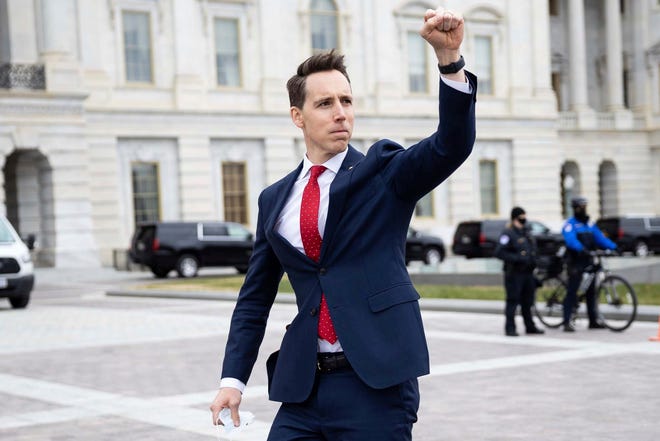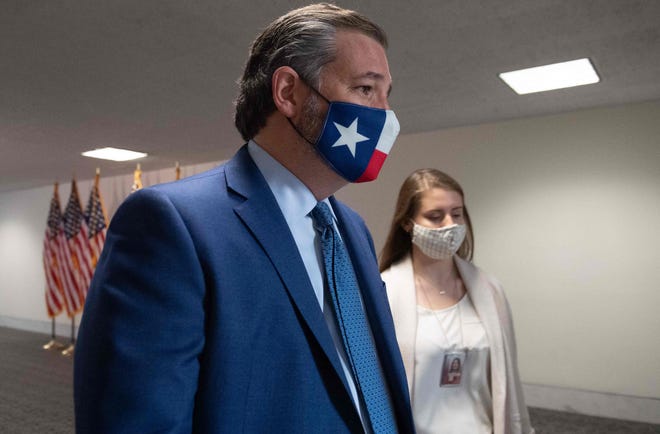With their phony legal arguments and pandering to Trump's baseless claims, Cruz and Hawley's bad behavior sets a bad precedent.
As Sen. Mitt Romney (R-Utah) said, accountability for the Jan. 6 invasion of the Capitol to disrupt Congress’s Electoral College count rests not only with President Donald Trump, but also with those who “object(ed) to the results of a legitimate, democratic election.” Romney was referring to, among others, Sens. Josh Hawley (R-Mo.) and Ted Cruz (R-Texas), both alumni of my Legislation classes at Yale and Harvard Law Schools.
The Ivy Leaguers irresponsibly magnified the president’s baseless claims of widespread voter fraud — but they tried to deepen that bogus indictment by pandering to those who "believe the election that just occurred, quote, was rigged," as Cruz put it, and with smart-sounding legal arguments criticizing judges and the legal process. They know the process worked normally because I taught them how the process works. Neither had a single constitutional or statutory point that had not been examined and rejected by a bipartisan bevy of judges and administrators.
Pennsylvania law under siege
The keystone state was Pennsylvania, where Hawley and Cruz were two of seven senators (along with 138 House members) voting to sustain objections to the lawfully chosen Electors. The congressional objectors largely avoided claims of fraud. Instead, they maintained that the rules followed in the Pennsylvania election were legally invalid. Their arguments disrespected the legal process established by the Constitution and statutes and interpreted responsibly by judges.

Sen. Hawley maintained that Congress was the proper forum for registering concerns about whether the Pennsylvania legislature’s 2019 law expanding mail-in voting violated the state constitution. Adopted by the GOP-dominated legislature, the law had never been challenged until after the 2020 election.
Trump's Twitter ban:Trump can't be silenced, even by Facebook and Twitter, but we can prevent another Trump
On Nov. 28, 2020, the Pennsylvania Supreme Court unanimously ruled in Kelly v. Commonwealth that the post-election challenge came too late. Permitting the challenge would disenfranchise millions of voters who had relied on the law, a point also made by Trump-appointed Judge Stephanos Bibas in a related federal lawsuit. At no point in American history has a state or federal appellate court retroactively disenfranchised a state’s electorate in a presidential election for such a reason.
Phony legitimacy to fraud claims
Republican House members picked up where Hawley’s argument collapsed: They claimed that the Pennsylvania secretary of State and Supreme Court had “usurp(ed),” as Rep. Fred Keller (R-Pa.) put it, the role of the legislature when they interpreted the 2019 law to allow three days for mail-in ballots to arrive.
In Pennsylvania Democratic Party v. Boockvar, the Pennsylvania Supreme Court applied the statutory timetable for mail-in ballots to a COVID-saturated environment and in light of the Post Office’s announcement that mail deliveries would be delayed. Following legislatively enacted canons of statutory interpretation, including an admonition that courts should apply statutes to avoid constitutional problems, the Court found a “legislative intent” to allow flexibility under emergency circumstances.
Impeach and convict:Trump doesn't deserve post-presidential benefits. Remove him and ensure he won't get them.
As my former students Cruz and Hawley know, statutory interpretation following the established rules is not an example of “usurpation." Led by Chief Justice John Roberts, for whom Hawley clerked, the U.S. Supreme Court twice rebuffed Republicans in Boockvar.

What point was served by the congressional rehash of frequently litigated and universally unsuccessful legal objections to Pennsylvania’s process? Sens. Hawley and Cruz made virtually no constitutional or statutory arguments that had not been rejected by Republican as well as Democratic judges. Neither they nor the House objectors revealed any literacy in the state constitution or its statutory interpretation code. Their press releases and speeches lent phony legitimacy to the president’s incendiary claims — claims that resulted in bombs near Capitol Hill and a historic insurrection that may be connected to at least five deaths.
Their bad behavior set a bad precedent for Congress, which has never second-guessed state electoral procedures so thoroughly vetted by the judicial process.
Henceforth, sore losers in future elections may feel free to relitigate election-year lawsuits. Congress’s presidential vote-counting, which was once a ritual marking the peaceful transition of authority, might become another trench in hyperpartisan warfare or, worse, a quadrennial opportunity to delegitimize our democracy.
William N. Eskridge Jr. is the John A. Garver Professor of Law at the Yale Law School. His most recent book is "Marriage Equality: From Outlaws to In-Laws" (Yale Press 2020) (co-authored with Christopher Riano).

No comments:
Post a Comment